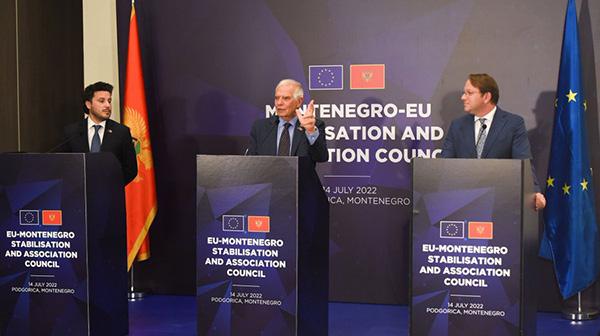
Today we have an Association Council for the very first time in one of our partners in the Western Balkans. This shows I think a strong and reinforced message to the whole region how much we not only cherish, but also consider important the partnership and association that we have with the Western Balkans.
Montenegro is of course not only just a partner, but also a candidate country – not only a candidate country, but also a negotiating candidate country which means that Montenegro has already achieved quite a bit, but still, the road ahead is long. We think that we have used todaythe opportunity not only to take stock of the implementation of our existing arrangements and agreements, like the Association Agreement, but also, we have discussed how to accelerate the EU accession, or integration rather into the European Union of Montenegro and the Western Balkans.
Of course, when you discuss these days with partners and friends and allies, the first topic to discuss is Russia’s war in Ukraine which is changing also the geopolitical context not only in Europe, but also around Europe. And therefore, our security has never been so important as it is today and this is why it is so important to have reliable partners and allies like Montenegro, who is fully aligning itself to our positions and we are on the same side on this war.
Of course, strategic priority was also – I think agreed by the both of us – to accelerate the integration on the ground, so the real integration of the economy, of the society, of the country as such into the European Union, but also how to make headway in the so-called negotiation process, or the accession negotiations if you want to use technicalities.
I think what is emerging from the meeting is the crucial importance of all political actors in Montenegro to speed up the reforms. We, on our side, we are ready to move much faster, but for that, we need delivery of reforms. In that, of course, much has already been done, we are at a crucial juncture with Montenegro – a crucial juncture, meaning that we have opened all the chapters of the accession negotiations and now it is time to start to close these chapters. But before doing that, we need to achieve considerable progress in the rule of law area; this is something not really new, this is something you have heard me explaining to you a number of times when I was here, and I think it is very important that now we see action being taken by the parliament and by the government. In the parliament of course, laws would have to be passed, appointments would have to be made, be it the judiciary, be it the freedom of the media and the protection of journalists or be it the fight against corruption and organised crime. But it does not stop here, because we need a track record on enforcing these laws, to make sure that we not only have laws, but we have an application and a proper enforcement in place, delivering results that can make us move to the next phase of accession negotiations. It is only through that, that we can speed up the pace, as it is enshrined in our methodology for the negotiations.
The other topic which is about the real integration of the Western Balkans into the European Union was about the Economic and Investment Plan. The Economic and Investment Plan, as I have already explained here a number of times, is the vehicle from Europe to accelerate the real integration, the catching-up between the European Union and the Western Balkans, mobilising one-third of the GDP of the entire region. And Montenegro could be one of the biggest beneficiaries – and I do not want to create here regional competition, do not get me wrong, it is not about that – but because the way in which we have designed this plan, which is a regional plan supposed to provide benefits for the entire region altogether, and given the big bottlenecks the country is facing, Montenegro could be the big beneficiary through building highways that are connecting Montenegro with Europe and with the rest of the Balkans, building railways that are providing trade possibilities and new trade routes for the country with the rest of the Balkans and with Europe, and of course, we have been discussing energy security issues which are very prominent these days.
Europe can be relevant, and Europe can provide huge assistance in all these challenges for Montenegro. Just to illustrate the level of contribution we can provide, let me give you one figure: it is EUR 1.3 billion that could be invested in this country to overcome these difficulties. But for that, again, we need delivery. We need to speed up the implementation of these projects and we need to deliver projects that are sound financially, that are sound in terms of the rule of law and that are sound in terms of public procurement and in terms of public finances. So, I think we have covered a number of topics, I think that the prospects despite the war in Europe for Montenegro are good and Europe is here, and Europe is delivering.
Details
- Publication date
- 14 July 2022
- Author
- Directorate-General for Neighbourhood and Enlargement Negotiations
